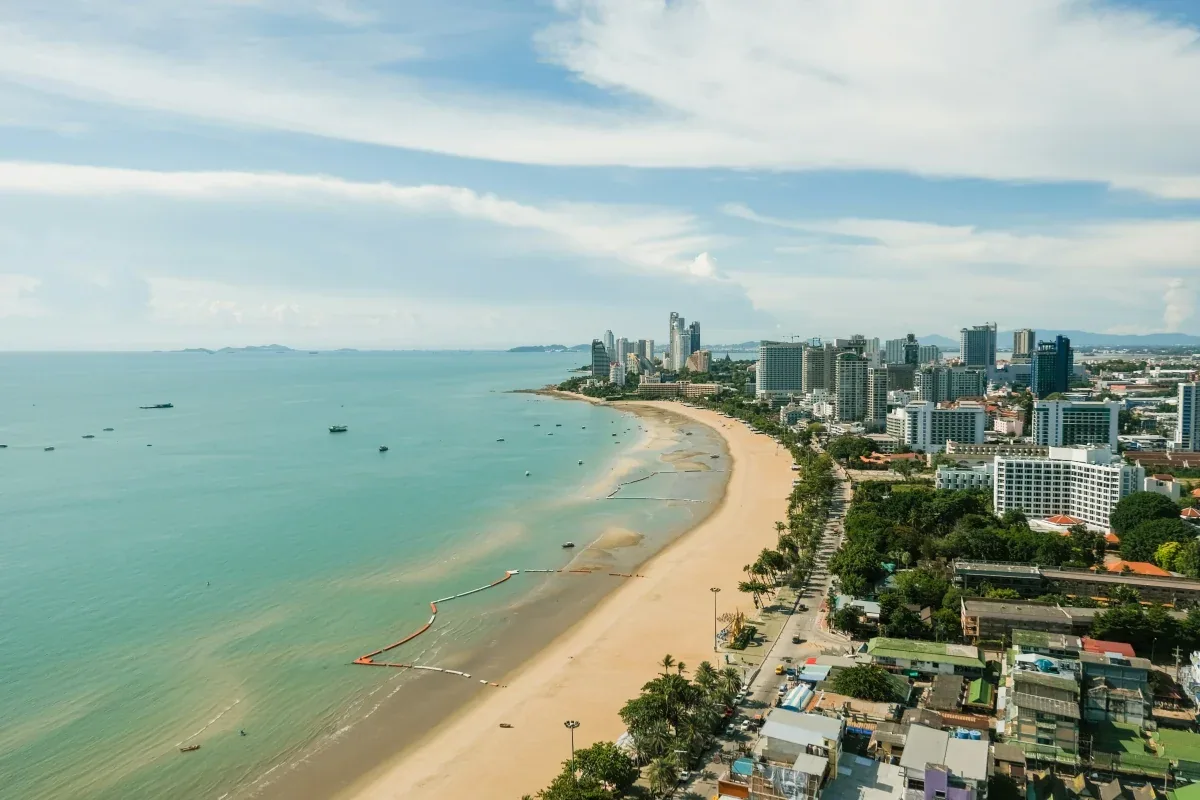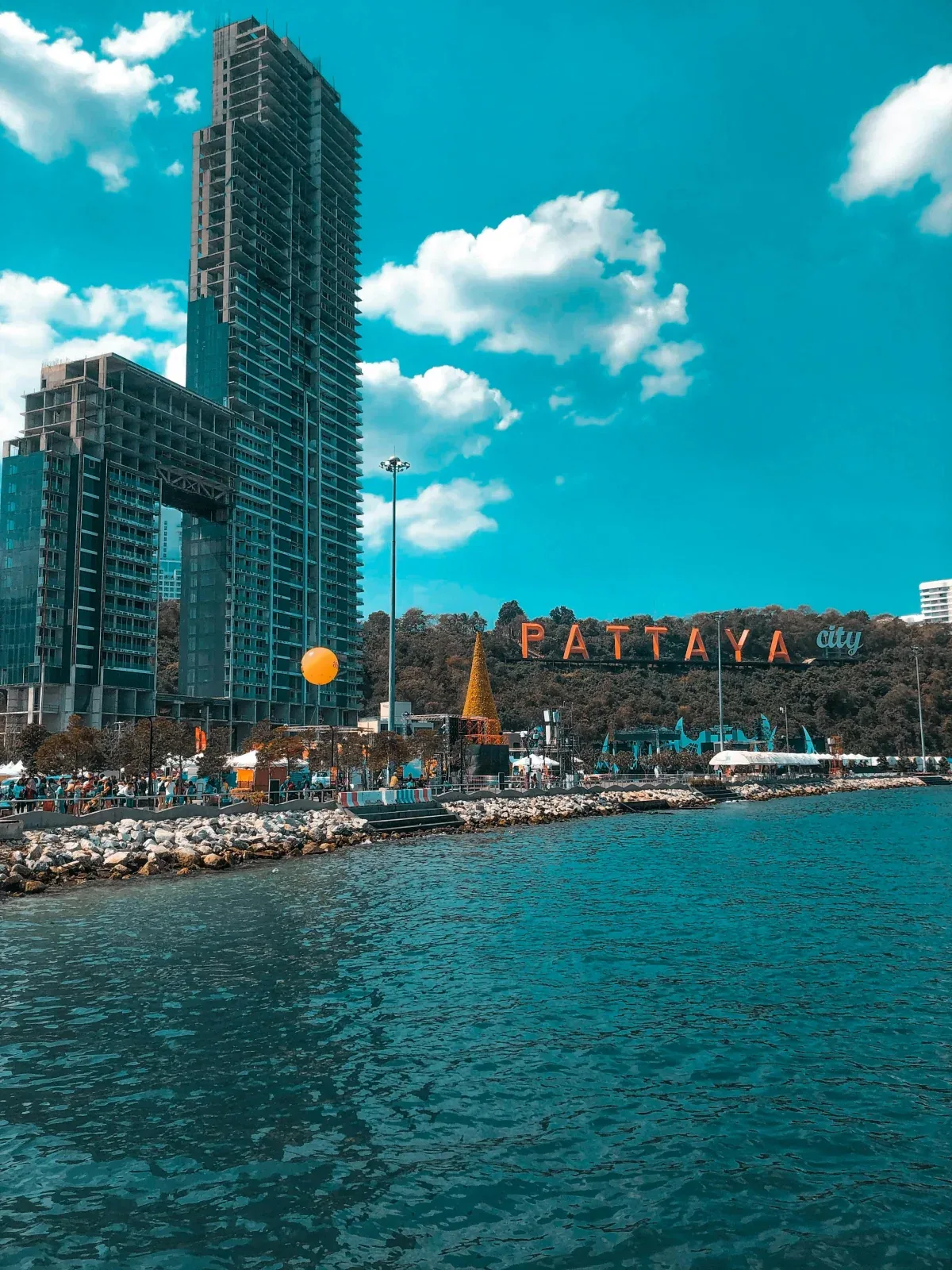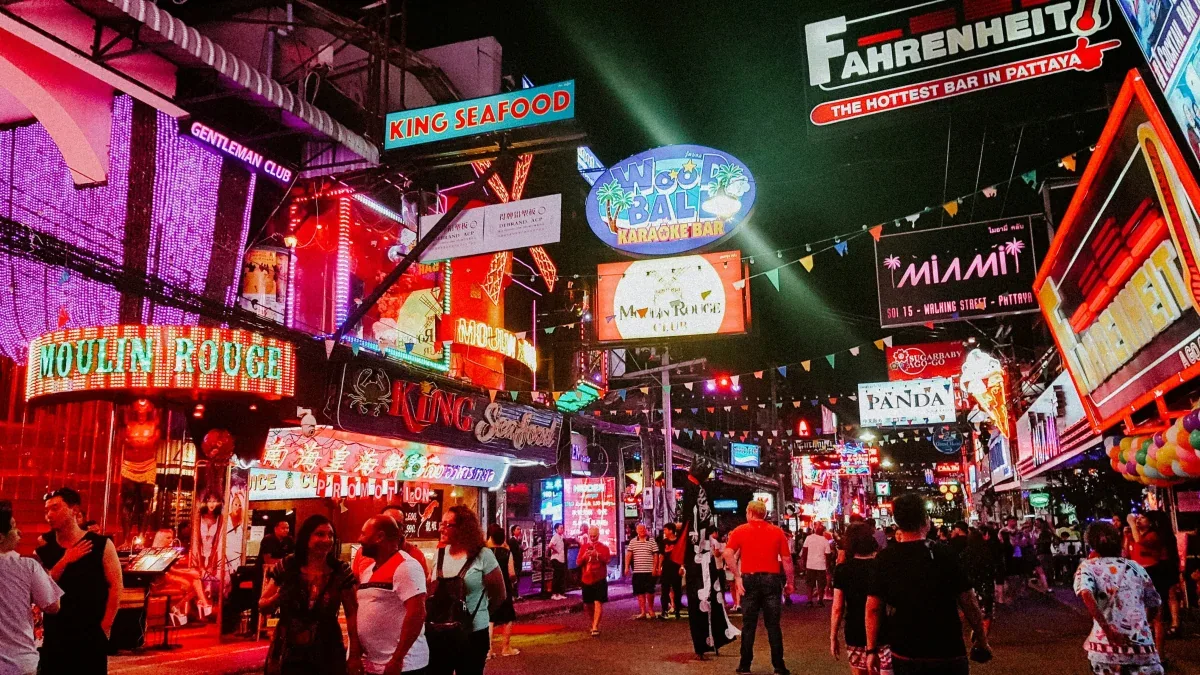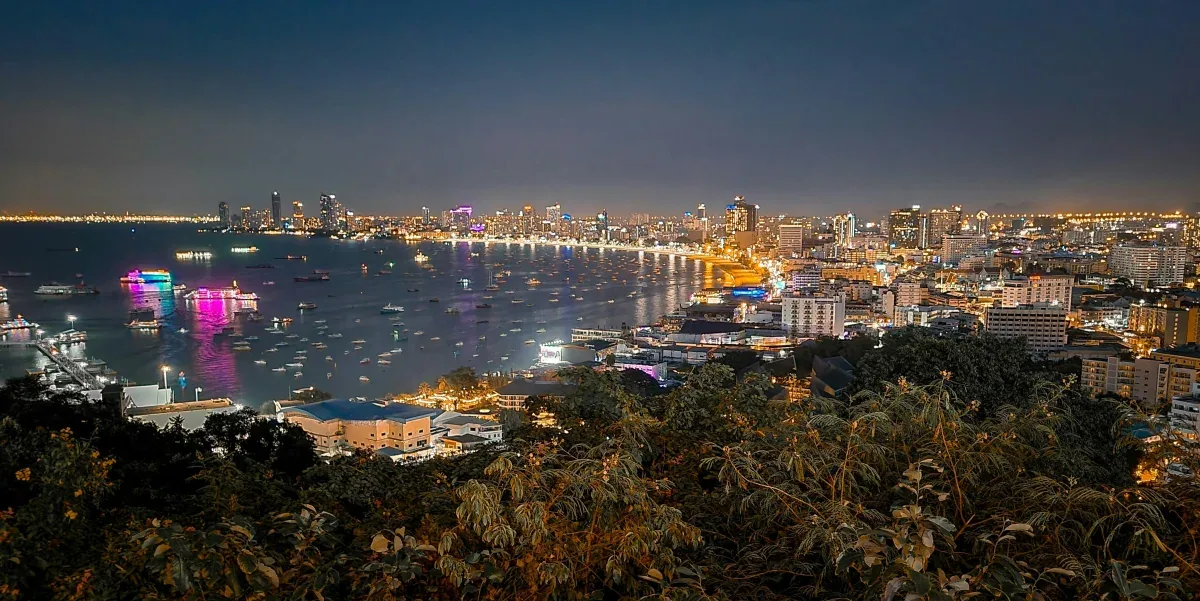
🌊Pattaya
Beach city reinventing itself as a serious expat hub

Beach city reinventing itself as a serious expat hub
Here's what everyone gets wrong about Pattaya: they think it's still 1985. Sure, Walking Street still pulses with neon at midnight. Beach Road still draws its crowds. But venture five minutes in any direction and you'll find something else entirely—retirees playing golf at championship courses, expat families pushing strollers through modern shopping malls, digital nomads working from air-conditioned cafes overlooking a surprisingly clean stretch of beach in Jomtien. Pattaya has been quietly reinventing itself for two decades, and most people haven't noticed.
Pattaya sits 150 kilometers southeast of Bangkok on Thailand's Eastern Seaboard, a 90-minute drive that transforms the capital's chaos into beachfront calm. What started as a fishing village, then exploded during the Vietnam War as an R&R destination, has evolved into Thailand's most polarizing city. Mention Pattaya in expat forums and you'll trigger fierce debates: some call it paradise, others a cautionary tale. The truth, as usual, lives somewhere more interesting than either extreme.
The numbers tell one story: over 100,000 expats from Russia, Europe, America, Australia, and the Middle East have made Pattaya home. Monthly living costs that start around 35,000 THB for a comfortable lifestyle. World-class hospitals like Bangkok Hospital Pattaya that rival anything in Bangkok. International schools serving hundreds of expat children. But the real story is about choice and trade-offs—understanding exactly what version of Pattaya you're signing up for, because this city offers at least half a dozen distinct experiences depending on which neighborhood you choose.
"The real story is about choice and trade-offs—understanding exactly what version of Pattaya you're signing up for, because this city offers at least half a dozen distinct experiences depending on which neighborhood you choose."
If you judged Pattaya only by its most famous street, you'd miss the entire point. The city stretches along nearly 15 kilometers of coastline, and each section has developed its own distinct personality. Central Pattaya—the dense urban core around Beach Road and Walking Street—is where Pattaya's reputation comes from. It's loud, crowded, unambiguously oriented toward nightlife and tourism. This is not where long-term expats live, with rare exceptions. It's the Pattaya that tourists see, that journalists write about, that colors every conversation about the city. And it represents perhaps 10% of the livable area.
Drive south fifteen minutes and you arrive in Jomtien, and suddenly Pattaya makes sense. The beach here is cleaner, wider, more swimmable. The vibe shifts dramatically—families on beach chairs, retirees walking their dogs, Thai locals selling grilled seafood from carts. Jomtien has developed into Pattaya's family-friendly alternative, the neighborhood where you might genuinely forget you're in Thailand's most notorious city. Rent a modern one-bedroom condo three blocks from the beach for 12,000 THB. Walk to quality international restaurants serving everything from authentic German food to Mexican tacos. Join the expat volleyball games that happen every afternoon. This is the Pattaya that works for people who want affordable beach living without the chaos.
Between central Pattaya and Jomtien sits Pratumnak Hill, the city's understated luxury zone. Here you'll find boutique hotels, upscale condos with panoramic sea views, and a noticeably more refined atmosphere. It's quieter, cleaner, more expensive—the kind of place where Bangkok professionals keep weekend condos and affluent retirees settle when they want proximity to Pattaya's amenities without living in the thick of it. A sea-view apartment in a modern tower runs 20,000-35,000 THB, which is still remarkably affordable compared to equivalent spaces in Phuket or Bangkok's riverside developments.

North of the city center, Naklua and Wongamat Beach present yet another face of Pattaya. The beach here is genuinely good—soft sand, relatively clear water, far fewer vendors and crowds. High-rise condos overlook the Gulf of Thailand, and the area feels more like a proper beach resort than urban sprawl. It's still developing, which means you get modern construction and facilities with that new-neighborhood energy. Expats here tend to be couples or retirees who want the beach lifestyle without compromise.
East Pattaya, particularly around Soi Khao Noi and Huay Yai, represents the suburban option. No beach access, but you get actual houses with yards, proximity to international schools like Garden International School and Regents, and a more Thai neighborhood feel. Families gravitate here because a three-bedroom house with a garden costs what a one-bedroom condo runs in central Pattaya. The trade-off is the commute—you're fifteen minutes from the beach and nightlife, which is either a blessing or a drawback depending on your priorities. For insights on finding and renting condos anywhere in Thailand, our housing guides provide detailed walkthroughs of the process.
Choose Jomtien if: You want affordable beach living with a family-friendly vibe, easy access to restaurants and amenities, and a more relaxed atmosphere. It's the safe bet for first-timers.
Choose Pratumnak if: You have a larger budget and want upscale surroundings, incredible views, and proximity to both the beach and central Pattaya without living in either zone.
Choose Naklua/Wongamat if: Beach quality is your top priority and you want modern facilities in a still-developing area with less crowd density.
Choose East Pattaya if: You have children in international schools, prefer houses over condos, and don't mind being away from the beach in exchange for space and suburban calm.
Let me tell you about Klaus, a retired German engineer I met at a Jomtien coffee shop. He lives on 42,000 THB per month, all-in. His one-bedroom condo three blocks from the beach costs 11,000 THB. He spends another 2,000 on utilities—electricity for air conditioning, water, internet fast enough for video calls with his grandchildren. Food runs him about 10,000 THB monthly, mixing Thai street food for lunch with home-cooked German dinners and weekly restaurant splurges. His scooter costs 3,000 THB monthly to rent, health insurance another 8,000, and the remaining 8,000 covers entertainment—golf, gym membership, social activities. He lives comfortably, eats well, maintains his health, and saves money compared to Germany. This is the Pattaya value proposition made concrete.
The cost of living in Pattaya runs roughly 30-40% below Bangkok's and significantly less than Phuket or Koh Samui. A modern one-bedroom condo in a good Jomtien building with pool, gym, and security averages 10,000-15,000 THB. Two bedrooms? 15,000-22,000 THB. You can spend more if you want sea views, newer construction, or premium locations, but the baseline for comfortable living is remarkably low. Electricity varies wildly based on air conditioning use—budget 1,500-3,000 THB monthly. Internet runs 600-1,000 THB for proper fiber speeds.
Food costs depend entirely on lifestyle. Eat Thai food exclusively—street noodles for 50 THB, rice with curry for 60 THB, seafood at local restaurants for 150-300 THB per person—and you'll spend 6,000-8,000 THB monthly. Add Western restaurants, imported groceries from Big C or Makro, and occasional splurges at Italian or steakhouse places, and you're looking at 12,000-18,000 THB. Pattaya's restaurant scene has genuinely impressed me. The large Russian and European expat populations have driven authentic cuisine availability far beyond what you'd find in similar-sized Thai cities.
→ Minimal lifestyle (comfortable but basic): 25,000-30,000 THB
→ Moderate lifestyle (what most expats do): 35,000-50,000 THB
→ Comfortable lifestyle (nice place, regular dining out): 50,000-70,000 THB
→ Upscale lifestyle (Pratumnak condo, frequent luxuries): 80,000-120,000 THB
Compare this to Bangkok where similar lifestyles run 15-25% higher, or Western countries where you'd need 3-4x these amounts

One of Pattaya's genuine advantages—and depending on your perspective, potential drawbacks—is its enormous, diverse expat community. Over 100,000 foreigners have made this their permanent or semi-permanent home, creating a social infrastructure that rivals much larger cities. Russians, Germans, British, Americans, Australians, Scandinavians, Arabs—Pattaya hosts them all, and each group has developed its own networks, restaurants, shops, and gathering places.
This means you can find your tribe regardless of background. Golf? Pattaya has some of Thailand's best courses—Siam Country Club, Laem Chabang, Phoenix Gold—and active golf societies that organize weekly games. Hash House Harriers run every Monday and Thursday. Rugby, cricket, and football clubs field teams. Diving shops run trips to nearby islands and wrecks. The Pattaya International Ladies Club organizes charity events. Rotary and Lions clubs operate multiple chapters. Whatever your interest, someone has probably already created a group around it.
For retirees especially, this social density becomes crucial. It's remarkably easy to build a social life in Pattaya—easier, I'd argue, than in Chiang Mai where the community is more dispersed, or Bangkok where everyone's too busy. You can join a regular coffee group, play bridge twice a week, volunteer with local charities, participate in pub quiz nights, and never lack for company. Loneliness, a real risk for solo expats, becomes much less likely when there are dozens of ways to connect with people who share your language and interests.
The healthcare advantage: Bangkok Hospital Pattaya and Pattaya Memorial Hospital both maintain international standards with English-speaking staff, modern equipment, and reasonable costs. Expats here have access to the same quality healthcare available in Bangkok, but without the traffic and urban stress. For serious medical needs, Bangkok's top hospitals remain just 90 minutes away.
Many retirees specifically choose Pattaya because this healthcare access, combined with affordable living costs, creates a sustainable long-term setup. Monthly health insurance premiums for older expats are more manageable when paired with Pattaya's lower baseline costs.
The flip side? Pattaya's expat bubble can become insular. It's entirely possible to live here for years without learning Thai, without meaningful Thai friends, without engaging with Thai culture beyond superficial transactions. You'll hear English everywhere, eat Western food daily, and exist in what amounts to a parallel society. Some people want exactly that—a comfortable retirement with beaches and good weather where they never need to struggle with cultural differences. Others find it hollow after a while, this life lived alongside Thailand rather than within it.
Let me be direct about who thrives in Pattaya and who struggles. Retirees with pensions or savings, particularly those prioritizing affordability, social access, and healthcare proximity—Pattaya works brilliantly for this demographic. You can live well on modest means, never lack for company, handle health issues competently, and enjoy beach access year-round. It's Thailand on easy mode, which isn't an insult when you're 65 and tired of adventure.
Golfers, specifically, have found paradise here. The concentration of quality courses within 30 minutes, the active golf societies, the affordable green fees compared to Western countries—serious golfers tell me Pattaya offers the best golf lifestyle in Southeast Asia. Pair that with low living costs and you understand why so many older golfers from Europe and America end up here.
Families? More complicated. The international schools here—Regents, Garden International School, ISP—are solid, and East Pattaya's suburban neighborhoods work well for children. But you need to be comfortable with your kids growing up in Pattaya, which means accepting its reputation and reality. Many expat families do fine here, particularly those who previously lived in Bangkok and want more space and lower costs. The kids play at the beach, parents appreciate the lifestyle affordability, schools provide quality education. It can work, but requires intentional community selection.

Digital nomads and remote workers under 40? Pattaya is less ideal. Chiang Mai offers better coworking culture, Bangkok better career networking, Koh Samui better beach quality. Pattaya's fast internet and low costs are appealing, but the social scene skews heavily toward retirees and the general vibe doesn't match what most younger remote workers seek. That said, Jomtien has developed a small community of younger expats who appreciate the value proposition, and if you're focused on minimizing costs while maintaining beach access, Pattaya delivers.
Solo women travelers and expats? This is where Pattaya shows its most difficult face. The city's gender dynamics, heavily influenced by its nightlife industry, create an environment where solo women often report feeling uncomfortable or dealing with unwanted assumptions. It's not impossible—I know several solo women expats who love Pattaya—but it requires thicker skin and careful neighborhood selection than other Thai cities. Jomtien and Pratumnak are better; central Pattaya is challenging.
Getting around Pattaya means embracing songthaews, those shared pickup trucks running fixed routes for 10-30 THB. They're cheap, frequent, and cover the main coastal roads, but won't take you everywhere. Most expats rent scooters (2,500-4,000 THB monthly) or own cars. Traffic is light compared to Bangkok, parking is abundant, and having personal transport dramatically improves quality of life given Pattaya's sprawling layout.
Bangkok access is excellent—hourly buses from two main stations (120-200 THB), minivans (150 THB), or your own car in 90 minutes outside rush hour. U-Tapao Airport, 40 minutes south, offers limited international flights plus Thai Airways connections to Bangkok and onward. For major international travel, Suvarnabhumi Airport is 90 minutes away. This Bangkok proximity is genuinely valuable—you get beach living but remain connected to the capital's superior hospitals, embassies, international flights, and urban amenities when needed.
Shopping and services exceed what you'd expect for a city this size. Terminal 21, Central Festival, and Royal Garden Plaza provide modern mall experiences with cinemas, restaurants, and international retailers. Makro and Big C Extra handle bulk shopping. Tesco Lotus (now Lotus's) and smaller supermarkets stock Western goods. Street markets, particularly the weekend market near Central Pattaya, offer cheaper Thai options. For specialized items, Bangkok is accessible enough to handle.
"Pattaya works brilliantly if you understand what you're getting: not Thailand's most beautiful city, not its most culturally rich, but possibly its most practical for affordable long-term living with modern amenities and robust expat infrastructure."
The weather deserves mention because it's genuinely better than many Thai locations. Year-round warmth (25-35°C) with less rainfall than the southern islands or western coast. The cool season (November-February) is superb—warm days, cool evenings, low humidity. Hot season (March-May) gets intense but isn't worse than Bangkok. The rainy season (June-October) brings occasional afternoon showers rather than the monsoon deluges that hit Phuket or Samui. Pattaya's east coast position and rain shadow from nearby mountains moderate extreme weather. The beach is usable year-round, though water quality varies seasonally and by location.
For those concerned about visas and legal residency, Pattaya offers no special advantages but benefits from Bangkok's proximity. Immigration office visits, visa extensions, work permit processing—all manageable locally, and Bangkok's larger immigration apparatus is accessible for more complex situations. The city has multiple visa agents (use with caution) and enough expats that you can find English-speaking lawyers, accountants, and other professionals familiar with foreign needs. For comprehensive information on visa options, see our guides on retirement visas and other long-term stay options.
Pattaya will never win beauty contests or cultural authenticity awards. It's not where you go to experience traditional Thailand or immerse yourself in centuries-old customs. The beaches aren't pristine, the architecture isn't charming, the atmosphere isn't sophisticated. What Pattaya offers instead is pragmatism at scale—a city that has figured out how to deliver comfortable, affordable living for foreigners with minimal friction and maximum infrastructure.
If you need things to work—healthcare, banking, utilities, shopping, services—Pattaya delivers. If you want social connection without effort, it delivers. If you want beach access without island prices or isolation, it delivers. If you want proximity to Bangkok without Bangkok's chaos and costs, it delivers. These are not romantic reasons to choose a city, but they're deeply practical ones that matter increasingly as you age or as your priorities shift toward comfort and sustainability over adventure and authenticity.
The city continues evolving too. New condo developments in Wongamat and North Pattaya target upscale buyers. The waterfront improvement project aims to beautify Beach Road. More family-oriented attractions open yearly. The Russian and Chinese markets have brought different energy and investment. Pattaya is actively trying to broaden its appeal beyond the reputation that defined it for decades, with mixed but genuine success.
Should you move to Pattaya? Visit first for at least a week, ideally a month. Stay in Jomtien, explore Pratumnak, check out Naklua. Talk to expats at coffee shops and restaurants—they're remarkably open about their experiences. Play golf if that's your interest, visit the hospitals, browse the supermarkets, spend evenings experiencing what entertainment options appeal to you. Pattaya works brilliantly if you understand what you're getting: not Thailand's most beautiful city, not its most culturally rich, but possibly its most practical for affordable long-term living with modern amenities and robust expat infrastructure. For many people at certain life stages, that practical excellence becomes exactly what they need. For others, it never will be. The key is knowing which camp you're in before committing. For more guidance on expat life across Thailand, explore our comprehensive living guides.
BEST FOR
NOT IDEAL FOR
QUICK FACTS
Jomtien
Family-friendly beach area. Best all-around choice for most expats.
Pratumnak Hill
Upscale condos with sea views. More refined atmosphere.
Naklua/Wongamat
Best beaches in Pattaya. Modern developments, less crowded.
East Pattaya
Suburban houses near international schools. Family-focused.
Healthcare
Bangkok Hospital Pattaya, Pattaya Memorial Hospital
Schools
Regents, Garden International, ISP
Shopping
Terminal 21, Central Festival, Royal Garden Plaza
Transport
Songthaew, Grab/Bolt, buses to Bangkok